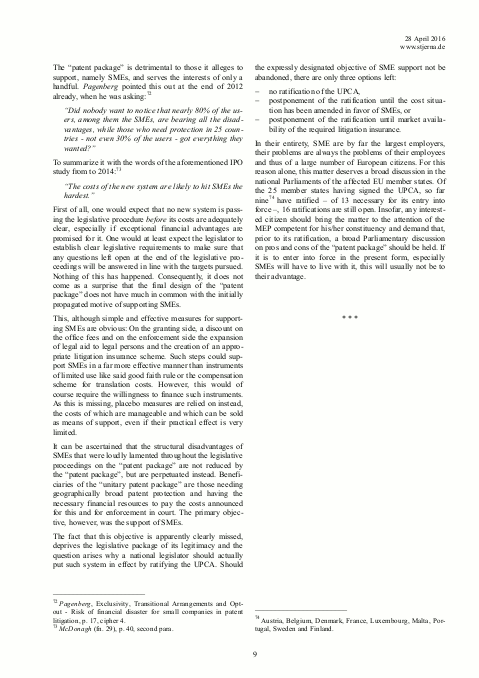

“Unitary patent” and court system – A poisoned gift for SMEs is the title of a new paper from Dr. Ingve Björn Stjerna, whom we mentioned here before because he closely studied the UPC for a long time (even before it was known as "UPC"). Based on the paper's PDF (permission granted for us to host a copy), there is a big gap between truth/reality and promotional claims (advertising). The SMEs are often being exploited by proponents of the UPC, who sort of 'hijack' the voice and SMEs and claim to speak on their behalf when they say that the UPC would better serve SMEs, not large corporations that often come from outside Europe.
 As the paper states in relation to Europe, "SME are by far the largest employers, their problems are always the problems of their employees and thus of a large number of European citizens. For this reason alone, this matter deserves a broad discussion in the national Parliaments of the affected EU member states. Of the 25 member states having signed the UPCA, so far nine have ratified – of 13 necessary for its entry into force –, 16 ratifications are still open. Insofar, any interested citizen should bring the matter to the attention of the MEP competent for his/her constituency and demand that, prior to its ratification, a broad Parliamentary discussion on pros and cons of the “patent package” should be held. If it is to enter into force in the present form, especially SMEs will have to live with it, this will usually not be to their advantage."
As the paper states in relation to Europe, "SME are by far the largest employers, their problems are always the problems of their employees and thus of a large number of European citizens. For this reason alone, this matter deserves a broad discussion in the national Parliaments of the affected EU member states. Of the 25 member states having signed the UPCA, so far nine have ratified – of 13 necessary for its entry into force –, 16 ratifications are still open. Insofar, any interested citizen should bring the matter to the attention of the MEP competent for his/her constituency and demand that, prior to its ratification, a broad Parliamentary discussion on pros and cons of the “patent package” should be held. If it is to enter into force in the present form, especially SMEs will have to live with it, this will usually not be to their advantage."
We already wrote several posts here on why the UPC has nothing to offer to European SMEs and should thus be rejected. There are no pros that we can see, only cons. It's a con. When patent lawyers and their media assert that UPC would serve SMEs one needs to stop and wonder what kind of clients they have (maybe potential patent trolls or their victims).
To quote the abstract of the paper:
On 16 February 2016, the German Ministry of Justice and Consumer Protection presented two pieces of draft legislation for the ratification of the international Agreement on the Unified Patent Court. After the fees for the “unitary patent” have been fixed and a proposal for the court fees and the limits of reimbursable representation costs at the Unified Patent Court has been provided, the political promise that the new system would support small and medium-sized enterprises (SMEs) can be judged against the realities. It does not come as a surprise that it is not being fulfilled. Most recently, even the European Commission declared that cost risk would be so significant that SMEs required an insurance to cover it, while admitting at the same time that currently no such insurance is available. An overview on desire and reality as to the costs of the “unitary patent” and the Unified Patent Court.